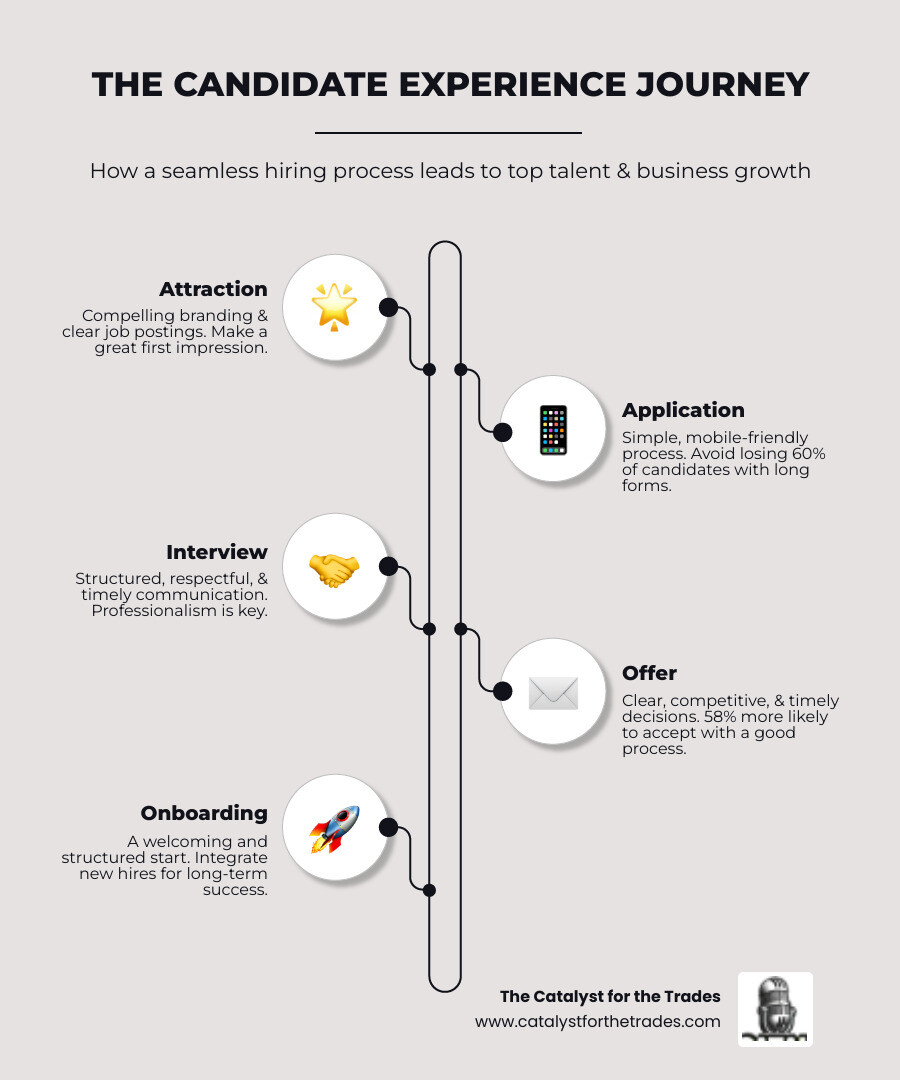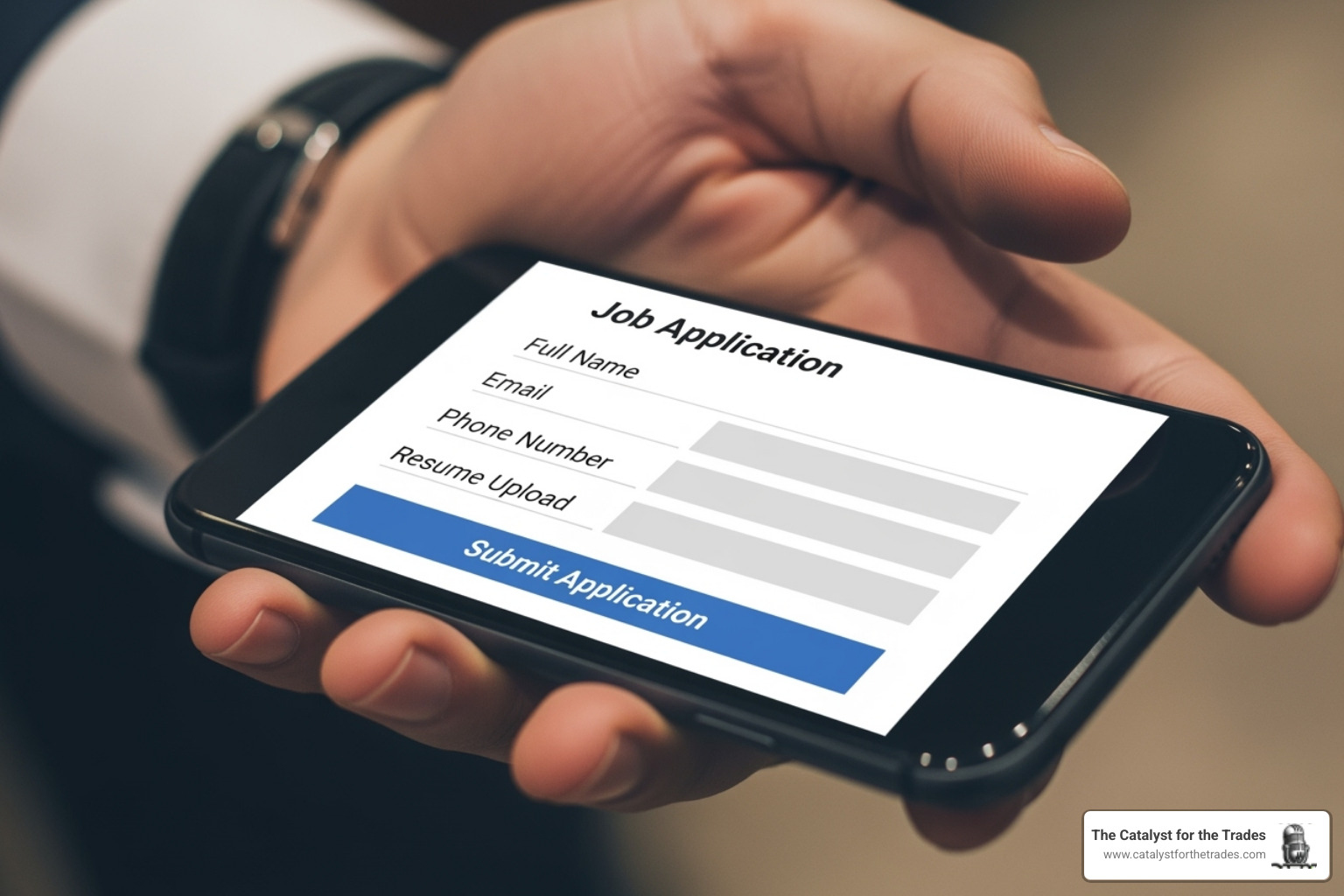Master strategic thinking: Boost decision-making, spot opportunities, and drive long-term success for leaders today!

The Candidate Experience Conundrum: Solving for Success
Why Candidate Experience Makes or Breaks Your Hiring Success
Candidate experience is how job seekers feel about your company throughout the entire hiring process - from finding your job posting to their first day on the job. It's the difference between landing top talent and watching them slip away to your competitors.
Here's what defines candidate experience:
- Application process - How easy it is to find and apply for jobs
- Communication - How well you keep candidates informed
- Interview experience - The professionalism and fairness of your hiring process
- Timeliness - How quickly you respond and make decisions
- Onboarding - How well you welcome new hires to your team
In today's tight labor market, trades businesses can't afford to ignore this reality. With skilled technicians in high demand, your hiring process often determines whether top candidates choose you or your competition down the street.
The stakes are higher than you might think. Research shows that 72% of candidates who have a poor recruiting experience share it online or with someone. That means a single bad interaction doesn't just cost you one candidate - it can damage your reputation and drive away future applicants.
But here's the good news: 58% of surveyed candidates feel that a good recruitment process increases the likelihood of them accepting the role. When you get candidate experience right, you're not just filling positions - you're building a competitive advantage that helps your business grow.
For home services business owners who are already juggling operations, customer service, and growth planning, candidate experience might seem like another item on an endless to-do list. But it's actually one of the most powerful tools you have for solving your talent challenges and scaling your business.

Why a Positive Candidate Experience is Non-Negotiable for Trades Businesses
Let's be honest - in today's home services market, you're fighting for every good technician, plumber, and HVAC specialist you can find. And here's the reality: your hiring process is often the first real conversation you have with potential team members. Make it a bad one, and you've lost more than just that candidate.
Candidate experience isn't some HR buzzword - it's your secret weapon for building the team that will grow your business. When skilled trades professionals have their pick of employers, the companies that treat candidates with respect and professionalism are the ones that land the best talent.
Think about it from a candidate's perspective. They're already working full-time, probably getting calls from other employers, and squeezing in interviews during their lunch breaks. If your process is disorganized, slow, or disrespectful, they'll move on faster than you can say "next applicant."
The math is simple: treat candidates well, and they'll want to work for you. Treat them poorly, and they'll tell everyone they know to avoid your company. In an industry where word travels fast, that reputation can make or break your hiring success.
The High Cost of a Bad Impression
Here's a sobering statistic: 72% of candidates share poor experiences online or with someone in their network. That means one frustrated candidate can influence dozens of potential future hires.
The damage goes beyond just lost talent. When your hiring process leaves candidates feeling ignored or disrespected, you're looking at negative online reviews that show up when people Google your company. And here's something many business owners don't consider - that candidate you treated poorly might also be a potential customer, or know someone who is.
Wasted resources add up quickly too. Every phone screen, every interview, every background check costs you time and money. When candidates drop out because of a poor experience, all that investment disappears. Even worse, candidates are 3.5 times less likely to re-apply after no communication, which means you lose them for future openings too.
The ripple effect touches your damaged brand reputation and can even impact your reduced customer base. In tight-knit communities where home service businesses operate, word spreads quickly about companies that don't treat people right.
The ROI of a Great First Encounter
Now for the good news - getting candidate experience right pays dividends that go far beyond just filling open positions.
When you create a positive, professional hiring process, you see higher offer acceptance rates immediately. 58% of candidates say a good process makes them more likely to accept your job offer. That means less time re-posting jobs and fewer delays getting your projects staffed.
Stronger employee engagement starts from day one when new hires feel valued from their very first interaction with your company. These employees tend to stay longer, work harder, and become your best ambassadors in the community.
The positive word-of-mouth effect is powerful in the trades. When candidates have a great experience - even if they don't get hired - they'll recommend your company to others. You're essentially building a talent pipeline of people who want to work for you, which reduces your future recruiting costs and time-to-hire.
This all adds up to serious business growth. When you can attract and keep the best technicians, you can take on more jobs, deliver better service, and build the reputation that drives long-term success. It's not just about hiring - it's about creating the foundation for everything else you want to achieve.
The Key Components of a Winning Candidate Journey
Building an exceptional candidate experience means looking at every touchpoint from the candidate's perspective. It's a journey, not just a series of steps.
Think of it like this: every interaction a candidate has with your company is like a handshake. You want each one to be firm, confident, and welcoming. The journey involves several critical stages, and each one offers you a chance to either wow potential hires or accidentally push them toward your competitors.
The magic happens when you focus on five key elements throughout this journey: strong employer branding that shows who you really are, clear communication that keeps everyone informed, smart use of technology that makes things easier (not harder), fairness in how you evaluate people, and timeliness in your responses. These aren't just nice-to-haves - they're the foundation of attracting top technicians and building a talent pipeline that fuels your business growth.
Stage 1: Attraction & Employer Branding
Before a candidate even thinks about applying, they're doing their homework on your company. This is where your employer brand - basically, your reputation as a place to work - either opens doors or closes them.
Your career site isn't just a boring list of job openings. It's your chance to show candidates what makes your company special. Is it easy to steer? Does it showcase your team having a good time at the company barbecue? Do you highlight your company values in a way that actually means something? Candidates typically spend about an hour researching before they apply, so make that hour count.
Social media presence is huge these days, even for trades businesses. Platforms like Facebook, LinkedIn, and yes, even TikTok can be powerful tools for showing off your company culture. Share behind-the-scenes moments, employee spotlights, and glimpses into your daily operations. When candidates see your team laughing together or celebrating a big project completion, they start picturing themselves as part of that story. Our guide on How to Turn Social Media into a Growth Engine for Your Home Service Business has some great ideas for getting started.
Job descriptions are often a candidate's very first impression of your company, so make them count. Skip the generic corporate speak and focus on what makes the role exciting. What does a typical day look like? What growth opportunities exist? For trades positions, be specific about the scope of work and any certifications needed. A well-written job description doesn't just list requirements - it tells a story about why someone would want to work for you.
Stage 2: The Application Process
Here's where many companies accidentally shoot themselves in the foot. We've all been there - faced with an endless application form that feels more like a endurance test than a genuine interest in our skills.

Simplicity should be your guiding principle. Keep application forms short and focused on what you actually need to know upfront. Research shows that 60% of job seekers quit long applications, and completion rates drop by almost 50% when you ask 50 or more questions. Don't let your application process become a barrier to finding great people.
Mobile-friendliness isn't optional anymore. Most job seekers are browsing and applying from their phones, especially in the trades. If your application doesn't work well on mobile, you're essentially putting up a "Do Not Apply" sign for a huge portion of your potential talent pool.
Transparency goes a long way toward building trust from the start. Tell candidates exactly what documents they'll need, how long the application should take, and what happens next. When people know what to expect, they're much more likely to stick with the process. Use streamlined application tools that make the experience smooth and professional.
Stage 3: The Interview
The interview stage is where the magic happens - it's your chance to really connect with candidates and see if they're a good fit. But remember, they're also interviewing you to see if your company is worth their time and talent.
Structured interviews are your friend here. This means asking all candidates for a specific role the same core questions. It might feel a bit formal at first, but it ensures fairness and helps you make better comparisons. Plus, it shows candidates that you take the process seriously and treat everyone with equal respect.
Timely communication can make or break your candidate experience. Nothing frustrates people more than being left wondering what's happening. Set clear timelines for your process and actually stick to them. If something comes up and you need more time, just let candidates know. A simple heads-up goes a long way.
Interviewer training is crucial, especially as you grow your team. Everyone who interviews candidates needs to understand how to represent your company well. They should know how to ask effective questions, listen actively, and create a welcoming environment. As leaders like George Donaldson have shown us, scaling a business often comes down to scaling your processes - and that definitely includes your hiring. Check out Building a $100M Business: George Donaldson on Scaling, Leadership, Exit Strategies in Home Services for more insights on structured growth.
Setting expectations before the interview reduces anxiety and lets candidates perform their best. Tell them who they'll meet, how long it will take, and what format to expect. Making sure candidates know what to expect isn't just nice - it's smart business that helps you see their true potential.
Stage 4 & 5: Offer & Onboarding
The journey doesn't end when you say "you're hired." In fact, these final stages are crucial for actually securing your new team member and setting them up for long-term success.
Clear offers should leave no room for confusion. Include all the important details about compensation, benefits, start dates, and any other relevant information. When candidates can easily understand what you're offering, they can make decisions faster and with more confidence.
Timely decisions are especially important in today's competitive market. Once you've found your ideal candidate, move quickly. Top technicians often have multiple offers, and delays can send them straight to your competitor down the street.
Welcoming new hires starts before their first day. Send a welcome packet, maybe introduce them to their future teammates virtually, and make sure all their equipment is ready to go. First impressions matter just as much after someone accepts your offer as they do during the interview process.
A buddy system can work wonders for helping new employees settle in. Assign someone to be their go-to person for questions, introductions, and general navigation during those crucial first few weeks. Research shows that seven in 10 employees with great onboarding say they have "the best possible job" - that's a statistic worth paying attention to.
Smooth onboarding is really just an extension of your candidate experience. It's about setting new employees up to win from day one. This includes proper training, helping them understand your company culture, and making sure they feel supported as they learn the ropes. Effective onboarding is a cornerstone of leadership and growth, as we explore in The Future of Leadership: How to Build a Team That Drives Growth.
How to Build and Improve Your Candidate Experience Process
Creating an exceptional candidate experience isn't something you can set and forget. It's like maintaining your service trucks - it requires regular attention, fine-tuning, and genuine care to keep everything running smoothly.
The good news? You don't need a massive HR department or unlimited budget to make meaningful improvements. With the right approach and some practical steps, any home service business can transform how candidates feel about their hiring process.
Optimizing the Application for a Better Candidate Experience
Think about the last time you filled out a job application. Was it painful? Did you give up halfway through? Your candidates are having the same thoughts about your application process right now.
Keep it short and sweet. A study on job applications found completion rates drop by almost 50% with 50+ questions. Aim for something that takes 5-10 minutes max. Ask yourself: do you really need to know their entire work history from the last 20 years just to schedule a phone call?
Mobile-first design isn't optional anymore. Most people are job hunting on their phones during lunch breaks or while sitting in their truck between service calls. If your application doesn't work well on mobile, you're losing great candidates before they even get started.
Avoid making candidates repeat themselves. If they're uploading a resume, don't force them to re-type everything that's already there. It feels like busy work, and busy work sends the wrong message about how you value people's time.
Be crystal clear about what you need upfront. If candidates need specific certifications or portfolio examples, tell them at the beginning. Nobody likes surprises, especially when they've already invested time in your process.
Using streamlined application tools can make a huge difference for both you and your candidates. The right technology can automate confirmations, organize candidate information, and create a smoother experience that reflects well on your business.
Mastering Communication Throughout the Hiring Cycle
Here's where many companies drop the ball completely. Poor communication during hiring is like showing up late to a customer's house without calling - it sends all the wrong signals about who you are as a business.
Automated acknowledgements are your friend. Send an immediate "we got your application" email. It takes two minutes to set up and makes candidates feel heard from day one.
Setting clear timelines shows you respect people's time. Tell candidates when they'll hear back and what comes next. If your process typically takes two weeks, say so. If it takes longer, that's fine too - just be honest about it.
Providing feedback sets you apart from 90% of other employers. You don't need to write novels, but a few sentences about why someone wasn't selected shows professionalism and respect. This is especially important for candidates who made it to the interview stage.
Rejection etiquette matters more than you think. A polite, timely rejection email beats radio silence every time. Thank them for their interest and effort. Remember - today's rejected candidate might be tomorrow's perfect hire or even a future customer.
Closing the loop means staying connected with good candidates who weren't quite right for this role. With their permission, keep them in your talent pipeline. The HVAC tech who wasn't ready for a lead position today might be perfect for it next year.
Creating a Fair and Engaging Interview
The interview is where the magic happens - or where everything falls apart. It's your chance to really connect with candidates while they're sizing up whether they want to work for you.
Structured questions keep things fair and focused. Use the same core questions for each role so you can compare candidates objectively. This doesn't mean being robotic - just consistent in covering the important stuff.
Trained interviewers make all the difference. Your lead technician might be great at fixing furnaces but terrible at interviewing people. Teach your team how to listen actively, take notes, and represent your company well.
Assessing for culture-add is smarter than just looking for "culture fit." Instead of hiring people who are exactly like your current team, look for candidates who bring fresh perspectives and experiences that can make your team stronger.
Respecting time is non-negotiable. Start and end on time. Be prepared. If someone took time off work or drove across town for your interview, honor that commitment. As Trey McWilliams often emphasizes, respecting people and investing in their development are crucial for scaling growth.
Interviews work both ways. Candidates are evaluating you too. Give them plenty of opportunity to ask questions about the role, the team, and what it's really like to work at your company. The best hires happen when both sides are excited about moving forward together.
Gathering Feedback to Continuously Improve
Here's the truth about building an exceptional candidate experience: you can't improve what you don't measure. The most successful home service companies we work with have one thing in common - they're constantly listening to their candidates and refining their approach based on what they learn.
Think of it this way: if a customer had a poor experience with your HVAC repair service, you'd want to know about it, right? The same principle applies to your hiring process. Every candidate who interacts with your company walks away with an impression, and that impression either helps or hurts your ability to attract top talent in the future.
Candidate surveys are your most powerful tool for gathering honest feedback. Keep them short and anonymous - nobody wants to fill out a 20-question survey after they've just been through your hiring process. Focus on the essentials: Was the application process straightforward? Did we communicate clearly throughout? How professional were your interviewers? What was your overall experience like?
The timing of these surveys matters too. Send them at key moments - after someone applies, after they interview, and especially after you make a hiring decision (whether they got the job or not). This gives you insights into every stage of your process.
One metric that's particularly valuable is the Net Promoter Score (NPS). Simply ask: "How likely are you to recommend our company to a friend or colleague as a place to work?" It's amazing how much this one question can reveal. We've seen companies improve their candidate Net Promoter Score by 55% in just one year by consistently collecting and acting on this feedback.
Don't overlook candidates who decline your offers either. These "exit interviews" can be goldmines of information. Maybe your compensation package isn't competitive. Perhaps your timeline was too long. Or it could be something as simple as unclear communication about benefits. A brief, friendly conversation with these candidates can reveal blind spots you never knew existed.
But here's where many companies drop the ball: they collect all this feedback and then... nothing. The most crucial step is taking action based on what you learn. If multiple candidates mention that your application process is confusing, fix it. If interviewers are consistently running late, address it. Show future candidates that you actually listen and care about their experience.
You need to be getting feedback from every candidate - not just the ones you hire. The candidate you don't hire today might be perfect for a role next year, or they might know someone who is. They could also be a potential customer. Treating every interaction as an opportunity to build your reputation pays dividends in ways you might not expect.
The goal isn't perfection - it's continuous improvement. Every piece of feedback is a chance to make your next candidate's experience a little bit better, and that adds up to a significant competitive advantage in attracting the skilled tradespeople your business needs to grow.
Frequently Asked Questions about Candidate Experience
What is candidate experience?
Candidate experience is the overall perception a job seeker has of your company's recruitment process, from their initial awareness of the job opening to the final hiring decision and onboarding. Think of it as their complete journey with your business - every email, every phone call, every interaction shapes how they view your organization as a potential employer.
It's not just about whether they get the job or not. A plumber who applies for a position with your company might not be the right fit for that specific role, but if you treat them with respect throughout the process, they could become a future applicant, refer talented friends, or even choose your services for their own home repairs.
How can a small trades business improve its candidate experience without a big budget?
Here's the truth: creating an exceptional candidate experience doesn't require deep pockets - it requires intention and consistency. The most impactful improvements often cost nothing but time and thoughtfulness.
Start with clear job descriptions that actually tell people what the job entails. Skip the corporate jargon and describe what a typical Tuesday looks like for your HVAC technician or office manager. Be honest about the challenges and exciting about the opportunities.
Prompt and respectful communication is your secret weapon. Respond to every applicant, even if it's just an automated acknowledgment. A simple "Thanks for applying - we'll be in touch within a week" email shows you value their time. Keep candidates updated on their status, and if there are delays, let them know.
Make your application process clean and simple. If someone can't easily apply from their phone during a lunch break, you're losing good people. Only ask for essential information upfront - you can gather details later in the process.
During interviews, be professional and prepared. Show up on time, have your questions ready, and give candidates a genuine chance to ask about the role and your company. They're evaluating you too.
Finally, add a personal touch wherever possible. A personalized email, a quick phone call to explain next steps, or a friendly greeting can transform an ordinary interaction into a memorable one.
How do you measure candidate experience?
Measuring candidate experience is like taking the pulse of your hiring process - you need both the numbers and the stories behind them.
Candidate satisfaction surveys are your direct line to feedback. Keep them short and send them at key moments: after someone applies, after they interview, and even after they decline an offer. Ask specific questions about what worked well and what could be better.
The Net Promoter Score (NPS) gives you a quick snapshot with one simple question: "How likely are you to recommend our company as an employer to a friend or colleague?" This single metric can reveal a lot about your overall candidate experience.
Your application completion rate tells an important story. If lots of people start your application but don't finish it, that's a red flag. Similarly, track your offer acceptance rate - top candidates who've had a great experience are more likely to say yes to your job offer.
Pay attention to your time-to-hire and how long each stage takes. While you want to be thorough, dragging out the process can frustrate candidates and cause you to lose good people to faster competitors.
Don't forget to monitor online reviews on platforms like Glassdoor. These reviews often provide unfiltered insights into how candidates really feel about your hiring process - both the good and the areas that need work.
Conclusion
Your candidate experience isn't just another HR checkbox to tick off—it's the secret weapon that separates thriving home services businesses from those struggling to find good people. When skilled technicians can pick and choose where they work, how you treat job seekers becomes your competitive edge.
Think about it this way: every interaction a candidate has with your company tells a story. Are you telling the story of a business that values people, communicates clearly, and operates with professionalism? Or are you accidentally broadcasting that you're disorganized, don't respect people's time, and might not be the best place to build a career?
The businesses that get this right see higher offer acceptance rates, more engaged employees who stick around longer, and a reputation that makes top talent want to work for them. They understand that treating candidates with respect and transparency doesn't cost extra—it just requires intention and follow-through.
But here's what really matters: this isn't a "set it and forget it" kind of thing. The best companies are always listening to feedback, making small improvements, and staying curious about how they can do better. They know that every candidate who walks through their process—whether they get hired or not—could become a customer, a referral source, or even the perfect fit for a future role.
People-first leadership starts before someone even becomes your employee. It starts the moment they see your job posting. When you invest in creating a positive experience from day one, you're not just filling positions—you're building the foundation for sustainable growth.
Ready to transform how you attract and hire great people? The team at The Catalyst for the Trades is here to help you build the systems and strategies that turn your hiring process into a growth engine. Learn more about scaling your trades business and find how putting people first can open up opportunities you never knew existed.

Discover how leading home‑service companies are leveraging AI, subscription models, and digital‑first strategies.
Learn why private equity, automation, and customer‑centric tech are reshaping the trades.
Episodes you may like


Discover business acumen: core components, traits of leaders, development steps & metrics to boost decision-making and scale success.

Lead your crew to victory! Master essential contractor leadership strategies for project success, safety, and team empowerment.
.png)





